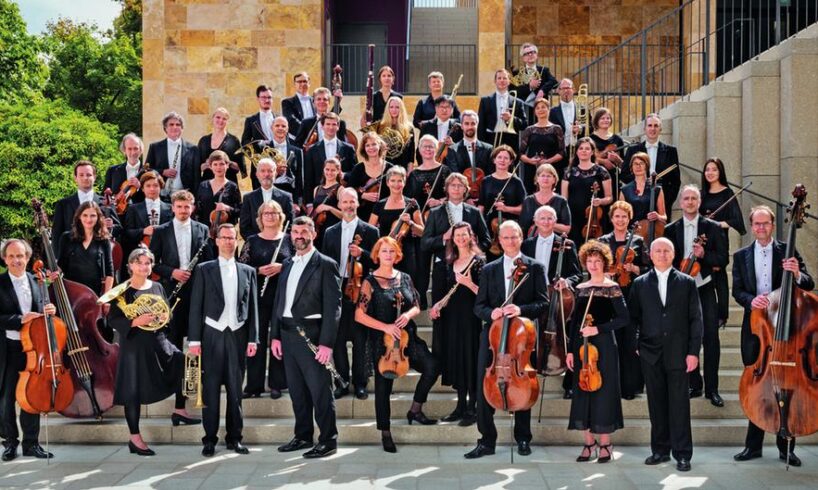
The Deutsche Kammerphilharmonie Bremen and Joseph Haydn (1732–1809), the great composer of the Viennese Classical period, are the subject of the documentary film, “The Haydn Expedition,” which is being shown in the Hall 424 convert venue in Hamburg Harbor.
The musicians in the film, headlined by Estonian conductor Paavo Jarvi, perform the second movement of Joseph Haydn’s String Quartet Op. 76, No. 3. The quartet movement’s melody was the musical template for the German national anthem, which begins with the words “Unity, justice, and freedom” — symbolic of the democratic themes underlying the film.
The Deutsche Kammerphilharmonie Bremen (DKB) is seen by many in the field of classical music as a role model due to its democratic organization and financial independence.
For Albert Schmitt, managing director of the orchestra, this democratic foundation has helped drive the orchestra’s success — alongside the virtuosity of its 41 musicians.
“The democratic approach creates the basis for each individual musician to identify with the orchestra as much as possible,” Schmitt said. “Everyone has a voice, everyone has the opportunity to contribute; and everyone is therefore constantly motivated to perform at their best.”
‘The Haydn Expedition’ is screening in HamburgImage: DW
From hippies to a professional orchestra
In 1980, the orchestra was founded by music students with the aim of making all decisions from the grassroots up. All members have a say about the selection of pieces to play, the choice of conductor, and the musicians who should be invited to perform.
“We nurtured democracy from an early age because we were looking to structure an orchestra in such a way that it belonged to the musicians, that the musicians were and would remain the owners,” Schmitt explained of the DKB.
Though once likened to a hippie commune, the orchestra has become more professional. In 1999, the musicians decided to restructure the orchestra into a corporation, and became responsible for their own financial management. Today, the DKB generates around 75% of its income from ticket and recording sales as well as sponsorship revenues, the balance coming from government subsidies.
Love at first sight
But democracy can also be exhausting. “Everyone here has their own opinion, especially when it comes to artistic decisions,” said violist Friederike Latzko, who has been with the ensemble since the start. “There’s intense discussion, and we all think that things ought to move much faster, but faster processes aren’t always better.”
The orchestra brings in high-profile conductors, produces more ambitious concerts, and is performing in more international venues.
In 2004, the DKB appointed Estonian conductor, Paavo Jarvi, as its artistic director.
“It was love at first sight,” said Jarvi. From the outset, the conductor has appreciated the orchestra’s working methods and structures.
“In a normal orchestra, musicians have rights,” said Jarvi . “But in the Deutsche Kammerphilharmonie, they have rights AND responsibilities.” With Järvi at the helm, the DKB has become one of the best orchestras in the world that’s renowned for its precision, transparency and democratic spirit.
Paavo Jarvi conductsd the orchestra in ‘The Haydn Expedition’Image: DW
Showing that Joseph Haydn’s music isn’t boring
In the documentary film, “The Haydn Expedition,” by director Christian Berger, a production by Deutsche Welle in collaboration with broadcaster, NDR, musicians reject the claim that Joseph Haydn’s music is boring. The film shows the passion and precision with which the musicians interpret Haydn.
The musicians and their conductor had decided — democratically, of course — to first perform Joseph Haydn’s 12 London Symphonies in concert and then record them later in the studio.
Before Joseph Haydn composed his London Symphonies, he was employed for many years at the court of Nikolaus II, Prince Esterházy in Vienna, a renowned patron of the arts.
When his patron died, a new life began for the 58-year-old Haydn: The court orchestra was disbanded and he became a freelance composer. He accepted an invitation to London, where he was celebrated, gave major concerts, and composed masterpieces, including the London Symphonies. And it is precisely this freedom that the musicians of the DKB have also laid claim to.
Democracy: ‘The best system we have’
During the panel discussion in Hamburg that accompanied the film screening, businessman Michael Otto, a long-time supporter of the DKB, spoke out strongly against top-down management, and in favour of inclusive democratic mechanisms.
“Today it is much more important for a team to play an active role and for a manager to simply create the framework conditions rather than authoritatively dictating from above what needs to be done,” he said.
Peter Limbourg, Director General of Deutsche Welle, who also participated in the panel discussion, spoke of a democracy that’s both valuable and vulnerable.
“Democracy is under pressure worldwide, but it is still the best system we have,” he said, refering to its inherent checks and balances.
This is the hallmark of the DKB’s approach: “The orchestra brings the values of democracy, transparency, and cooperation to the world,” Limbourg explained.
The Haydn Expedition — Joseph Haydn rediscovered
To view this video please enable JavaScript, and consider upgrading to a web browser that supports HTML5 video





